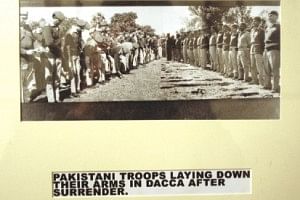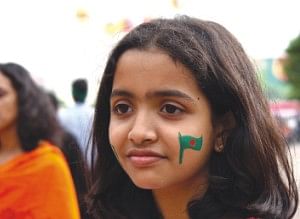| Education
The History that Matters
Anika Hossain
 How many of us know about the origins of Bengal? When we refer to the history of Bangladesh, the liberation war comes to mind and we all know the gist of what happened in 1971, but what about before that? How many of us know that around 100 BC, the Greeks had named an area of Bengal Gangaridai (Land with the Ganges in it's heart), that the first recorded independent king of Bengal was Shashanka who reigned around the year 606, that the first Buddhist Pala king of Bengal, Gopala-I came to power in 750 in Gaur by election, and that this event is recognised as one of the first democratic events in the history of South Asia. It will be safe to assume that a majority of us, especially the current generation of Bangladesh are unaware of our rich historical heritage. How many of us know about the origins of Bengal? When we refer to the history of Bangladesh, the liberation war comes to mind and we all know the gist of what happened in 1971, but what about before that? How many of us know that around 100 BC, the Greeks had named an area of Bengal Gangaridai (Land with the Ganges in it's heart), that the first recorded independent king of Bengal was Shashanka who reigned around the year 606, that the first Buddhist Pala king of Bengal, Gopala-I came to power in 750 in Gaur by election, and that this event is recognised as one of the first democratic events in the history of South Asia. It will be safe to assume that a majority of us, especially the current generation of Bangladesh are unaware of our rich historical heritage.
Until a few years ago, a majority of the English Medium schools in Dhaka did not have a subject solely dedicated to the study of Bangladeshi history. While students learned about the general history of South Asia and other parts of the world, they had no in-depth knowledge of how their own country came into being.
They learned about the war of 71, the Bir Sreshthos, about Rabindranath Tagore and Kazi Nazrul Islam as a part of their Bengali Literature syllabus, but these lessons too, lacked the details required to really understand what our country is all about. However, the government of Bangladesh has sought to rectify this situation by introducing Bangladesh Studies (BST) as an independent and mandatory subject for all students during their primary education. Although the government is yet to confirm whether private English medium schools fall under the new education policy, many well known English Medium educational institutions have adopted Bangladesh studies as a part of their syllabus.
"We start teaching a little bit of physical geography in class one and go into more detail with the children in class 3, and Bangladesh Social Sciences are introduced and studied in classes 6,7, and 8. It is also offered as an O'Levels subject," shares Niloufer Choudhury, a teacher at South Breeze School. "The children start to learn about the history and culture of Bangladesh when they are in Nursery, they also learn much about their country's history in their Bengali classes. They learn about the freedom fighters, famous artists, cultural festivals and seasons and are given assignments to write and speak about these subjects in school. The children are also encouraged to keep up with current events. We subscribe to Prothom Alo and there is a copy of the newspaper on every floor in our school. All students are encouraged to read these, especially the children's sections and are expected to prepare reports on them. Apart from cultural functions and seasonal fairs, children learn Bangladeshi songs in their music classes and are also encouraged to make scrapbooks about their country. Bangladesh Studies is offered as an O'Levels subject, but unfortunately no one in our school is currently taking this class," she explains.
According to Nahid Arefa Siddiqui, the vice principal of Siddiqui's International School, Bangladesh Studies has been a part of their curriculum for about four or five years. "Bangladesh Studies is a part of our overall History syllabus, not a separate subject, and is compulsory for all students from classes 2 to 7. Our students learn the history of the country starting from the early history of the Pal Bongsho and the Sen Bongsho, the British Era etc. They also learn about the tribal history of Bangladesh, the culture and the geography, which includes in-depth details about our land, water bodies and climate. We have cultural festivals for our students for Pohela Boishakh, the fruit festival etc. The students are also assigned project work about different aspects of Bangladesh because we believe that children learn better when they can visualise what is in their textbooks. We want our children to know their country and be proud of their cultural heritage. If they go abroad to study or pursue a career, we want them to take a part of Bangladesh with them, inside them no matter where they are," says Siddiqui.
The students however, don't seem to be very enthusiastic about this change in curriculum, very few students have been taking Bangladesh Studies as an O'Levels subject. "Students are not interested in Bangladesh Studies. They think it is a useless subject, which will not help them in the future. What they don't understand is, when they go abroad and people ask them about their motherland whether at a social gathering or a job interview, they will be embarrassed because they won't have any knowledge to share about the country they have grown up in," says Shabnam Ahmed, coordinator and academic counselor at Dhanmondi tutorial. "When I started teaching at this school, most of my students could not draw a map of Bangladesh. I learned at the workshop recently, that we have to motivate our students to learn more about Bangladesh, by making the subject interesting for them. At Dhanmondi tutorial, we teach students the history of the subcontinent, starting from 1952 up until liberation. They also learn all about the family tree of Indo-European languages and they learn about the Mughal period. They also learn about Zafar Iqbal, poets like Lalon and Jibanondo Das," she says. "We also have cultural festivals, fairs and programmes for Ekushey February for educational purposes. We try our best to make this country as interesting to them as possible, and yet very few students are interested to take up BST as an O'Levels subject."
 |
“I enjoy learning about my country.” Photo: zahedul i khan |
The students at Sunnydale School seem to be of the same frame of mind. "We offer BST to O'Level candidates but very few have taken it so far," says Jabeen Mahtab, academic coordinator at Sunnydale Senior School. Not only do we teach our students Bangladeshi history, we also make sure they are aware of current events and make sure they contribute to the society in whatever way they can. We have fundraisers whenever there are natural disaster such as floods or incidents such as the Nimtoli fire. We had bake sales during lunch period and students sold food to raise money to buy medicine for the victims of Nimtoli. We bought medicines and selected a group of students to donate them personally to Dhaka Medical College. Apart from this we encourage project work about Bangladesh and celebrate cultural and religious festivals with our students," she concludes.
"I teach children between the ages of 3 and 4 and they know basic historical facts about our liberation war, they know our national fruit, bird and animal, about our religious holidays. When I talked to them about our liberation war, one of my little ones asked me if the Pakistanis had said sorry for hurting us during the war, which goes to show their depth of understanding at such a young age," says Riffat Hossain, a playgroup teacher at Sunbeams School. Sunbeams School offers Bangladesh Studies as a compulsory subject until it is time for students to choose their subjects for their GCE exams.
Other schools such as The Aga Khan School, Loreeto School and European Standard School do not have Bangladesh Studies as an independent subject, but do teach the history of our country in as much detail as possible. Most English medium schools in Dhaka are offering Bangladesh Studies to O'Level candidates.
"I enjoy learning about my country, but I don't think BST will help me with my career in the future," says Shafin Ahmed, a student of South Breeze School. Many members of our current generation may think the same way. However, we must remember that as important as it is to keep up with the current affairs of our nation and the world around us, our history is just as important, because it helps us value what we have today and appreciate our nation and our people for how much we have achieved and can achieve in the future.
The effort these schools are putting in to educate our youth about this country is commendable. Parents of our current generation should help and encourage teachers to continue their hard work and motivate our youth to take interest in Bangladesh and realise that we need their help to work towards a brighter future.
Copyright
(R) thedailystar.net 2010 |
|
